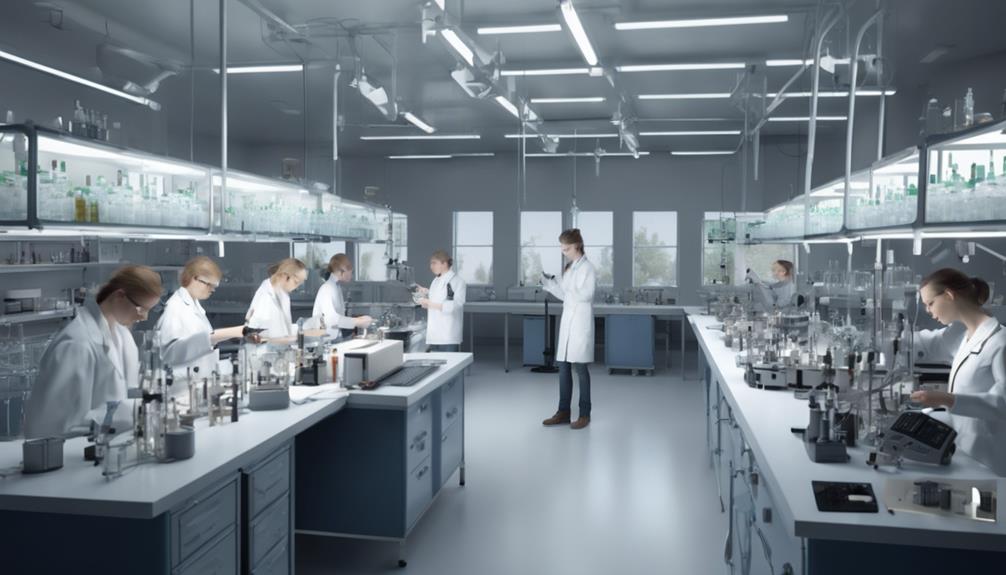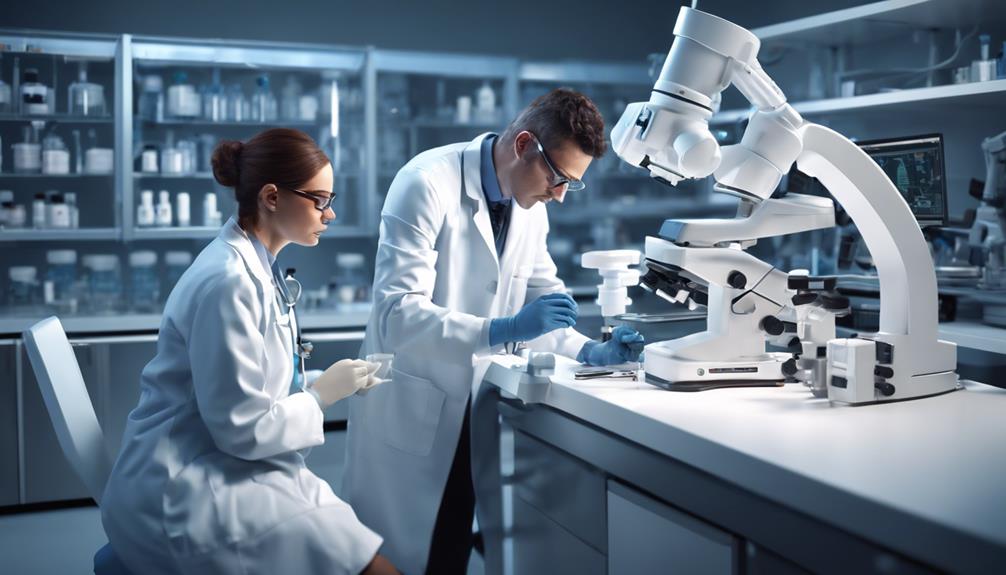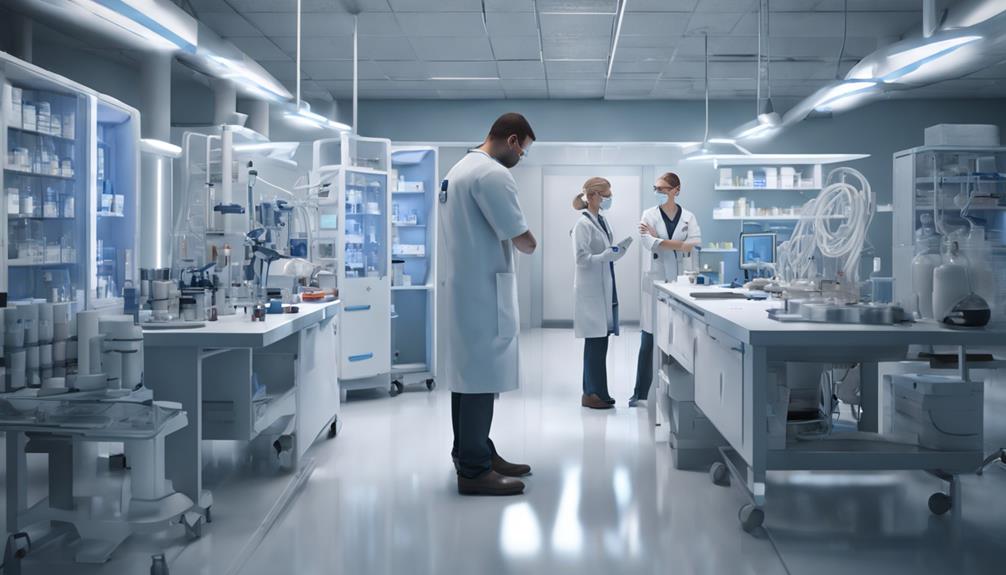
As you explore careers in the medical lab, it's key to know that medical technicians typically perform routine lab tests and manage basic lab equipment under direction, needing maybe an associate's degree to get started. On the other hand, medical technologists dive into more complex testing, operate advanced equipment, and interpret data, usually holding a bachelor's degree. You're looking at technicians ensuring the processes run smoothly, while technologists take on a more analytical role, often diagnosing the causes behind unusual test results. Discovering more about how each position contributes to patient care could significantly impact your career choice.
Defining Medical Technician

A medical technician is a professional who supports medical specialists by performing various diagnostic tests and handling lab equipment. You'll find them bustling in hospital labs or clinic settings, where they play a crucial role in the healthcare delivery process. Their day-to-day tasks mainly involve collecting samples, conducting routine lab tests, and maintaining the instruments they use.
As a medical technician, you wouldn't typically be responsible for more complex procedures or analysis. Instead, your job centers around executing pre-defined tasks under the supervision of more senior lab personnel. This could include preparing reagents, performing blood counts, and managing documentation required to comply with healthcare regulations.
You should be aware that your training would be specific but less extensive than that of a technologist. Typically, you'd need an associate degree or a postsecondary certificate. This educational path ensures you're quickly equipped with the practical skills needed to support diagnostic and therapeutic procedures.
Your role is fundamental in ensuring that patient results are accurate and timely, facilitating swift and appropriate medical responses. This makes you an integral part of the medical team, contributing directly to patient care and treatment outcomes.
Defining Medical Technologist
While medical technicians handle routine lab tasks, medical technologists often take on more complex analytical roles. As a medical technologist, you'd delve deeper into the investigative processes that underpin laboratory medicine. You're the backbone in the development and validation of test results, which are crucial for accurate diagnosis and treatment plans.
You'd find yourself operating sophisticated laboratory equipment that requires a keen understanding of technological and scientific concepts. Unlike technicians, who might perform more manual or predefined tests, you'd engage in activities that demand critical thinking and advanced problem-solving skills. Your role involves not just following procedures but also optimizing them, ensuring quality control, and interpreting the more intricate data that machines and test outcomes present.
Your daily responsibilities could range from conducting chemical analyses of body fluids, such as blood and urine, to cross-matching blood for transfusions. The complexity of your tasks allows you to serve as a vital consultant to physicians. You'd offer insights based on laboratory results to help tailor patient management strategies.
In this way, you don't just contribute to individual patient care, but you also play a significant role in the broader context of health services, ensuring reliability and accuracy in laboratory testing.
Educational Requirements

To become a medical technologist, you'll need to pursue a bachelor's degree in medical technology or a related field. This degree typically spans four years and delves into subjects like chemistry, microbiology, and various diagnostic laboratory techniques. You'll also engage in clinical rotations, which offer you hands-on experience in real healthcare settings, preparing you practically for your future role.
On the other hand, if you're aiming to be a medical technician, the path is somewhat shorter. Generally, you can start your career with an associate's degree in clinical laboratory science or a related field, which you can complete in about two years. This program still covers fundamental sciences and lab skills but with less depth compared to the bachelor's program required for technologists.
Both educational paths include a mix of classroom learning and practical laboratory experience. However, the intensity and depth of study differ, aligning with the differing responsibilities you'll face in each role.
As a technologist, you'll need a more thorough understanding of lab procedures and diagnostics than a technician, who primarily assists and carries out routine tests under supervision.
Certification Processes
Earning certification is essential for both medical technicians and technologists, showcasing your expertise and commitment to the field. As you navigate your career path, you'll find that certification isn't just a formality but a crucial step that can significantly impact your professional credibility and marketability.
For medical technicians, certification typically involves passing an exam administered by a recognized accrediting body, such as the American Medical Technologists (AMT) or the National Healthcareer Association (NHA). These exams assess your foundational knowledge and practical skills necessary for the role you're preparing to enter.
On the other hand, medical technologists often require a more comprehensive certification process. This usually includes a rigorous examination from the American Society for Clinical Pathology (ASCP) or a similar organization. The ASCP certification, for instance, not only tests your technical proficiency but also your understanding of complex laboratory procedures and your ability to handle advanced diagnostic equipment.
It's vital to keep in mind that maintaining your certification involves continuing education and periodic re-certification exams. This ensures you're up-to-date with the latest advancements in your field, helping you stay competent and competitive.
Primary Responsibilities

Medical technicians and technologists have distinct primary responsibilities that are essential to healthcare delivery. As a medical technician, you'll often handle routine lab operations and basic testing procedures. You're the frontline in sample collection, preparation, and simple analysis, ensuring that results are timely and accurate. This role requires precision and a strong ability to follow detailed instructions.
On the other hand, as a medical technologist, your tasks are more complex and analytical. You're not just performing tests; you're also interpreting the results and might even be involved in developing and modifying procedures. This position demands a deeper understanding of the biological, chemical, and physical principles underlying each test. You'll need critical thinking skills to diagnose the cause of unusual outcomes and expertise to ensure that testing methodologies meet the highest standards.
Both roles are crucial, but while technicians focus on the execution of established testing protocols, technologists delve deeper into the whys and hows, often taking on supervisory responsibilities.
You'll find that your day-to-day duties reflect these differences, each critical to the smooth operation of medical laboratories and the ultimate provision of healthcare services.
Work Environments
Both medical technicians and technologists work in varied settings, from hospitals to private laboratories. As a medical technician, you might find yourself in smaller clinics or physician's offices, where you'll handle routine lab tests that are critical for patient care.
On the other hand, if you're a medical technologist, you're more likely to work in larger hospital settings or specialized diagnostic labs. Here, you'll delve into more complex testing and analysis, playing a crucial role in interpreting results that can influence medical treatments.
You could also be employed in blood banks, where the environment demands precision and a high level of attention to detail. Here, the distinction between technicians and technologists becomes evident, as technologists often oversee the work, ensuring that all procedures adhere to strict regulatory standards.
Moreover, many find opportunities in research facilities and universities, contributing to advancements in clinical procedures and diagnostic tools. In these settings, your role might stretch beyond routine tasks and involve participating in experimental research or developing new lab testing methodologies.
Career Advancement Opportunities

Often, you'll find that pursuing additional certifications can significantly boost your career prospects in the medical laboratory field. Specializing in areas like molecular biology or clinical chemistry opens doors to supervisory roles or positions in more specialized laboratories. As you gain more qualifications, you might also consider transitioning into research roles, or even teaching positions in educational institutions.
For medical technicians, moving up often means becoming a medical technologist. This transition typically requires further education—perhaps a bachelor's degree if you don't already have one. Additional certifications, like those from the American Society for Clinical Pathology (ASCP), can also pave the way for this advancement.
As a medical technologist, you're positioned to explore even broader opportunities. Leadership roles within laboratory settings become attainable. You could take on responsibilities as a lab manager or a chief technologist, overseeing the work of others and managing the day-to-day operations of a clinical laboratory. With substantial experience and continued education, you could even influence laboratory policies or become involved in the administration of healthcare services.
Impact on Patient Care
The roles of medical technicians and technologists significantly influence the quality of patient care in healthcare settings. As a medical technician, you're often the first to process clinical lab tests that guide diagnoses. Your accuracy and speed can make a big difference in how quickly a patient receives treatment.
Meanwhile, as a medical technologist, you dive deeper into complex analyses, which requires a high degree of precision. Your work not only supports accurate diagnosis but also helps in monitoring ongoing treatment, ensuring that patients receive the most effective care based on reliable data.
Your roles are critical because errors or delays can lead to misdiagnosis or inappropriate treatment. For instance, if you're a technician handling blood samples and you cross-contaminate or mislabel them, the result could mislead a doctor's decision-making process.
Similarly, as a technologist, if you misinterpret a specimen's molecular data, it could affect the treatment protocol prescribed, possibly harming the patient rather than helping. You both play a vital role in the healthcare continuum, ensuring that every patient's treatment plan is based on precise and timely information.
Thus, your dedication and expertise directly contribute to the health outcomes and satisfaction of the patients you serve.
Frequently Asked Questions
What Are Common Stress Levels for Medical Technicians Vs. Technologists?
You'll find that stress levels can vary widely between medical technicians and technologists, often depending on their specific roles, responsibilities, and the healthcare settings in which they're employed.
How Do Job Satisfaction Rates Compare Between the Two Roles?
You're exploring how job satisfaction rates vary between medical technicians and technologists. Generally, technologists report higher satisfaction due to their advanced responsibilities and higher involvement in analytical tasks compared to technicians.
What Are Typical Work Hours for Medical Technicians and Technologists?
You'll find that medical technicians and technologists often work similar hours, including nights, weekends, and holidays due to the round-the-clock needs of healthcare facilities, but shifts can vary significantly by workplace and role.
Can Medical Technicians Legally Perform Lab Analyses?
You're wondering if medical technicians can legally perform lab analyses. Generally, they can under supervision, but it varies by region and specific certifications. Always check local regulations to confirm what's permitted in your area.
What Is the Average Retirement Age for Both Professions?
You're curious about when you can retire from these roles. Typically, the average retirement age for both medical technicians and medical technologists is around 65, but this can vary based on individual circumstances.
Conclusion
You've seen that while both medical technicians and medical technologists play crucial roles in healthcare, their responsibilities, education, and certification differ significantly.
As a medical technician, you'd perform basic lab tasks, whereas as a technologist, you'd tackle more complex analyses. Both careers offer ample advancement opportunities, impacting patient care profoundly.
So, whether you lean towards being a technician or a technologist, you're stepping into a vital field that saves lives and shapes the future of health.






